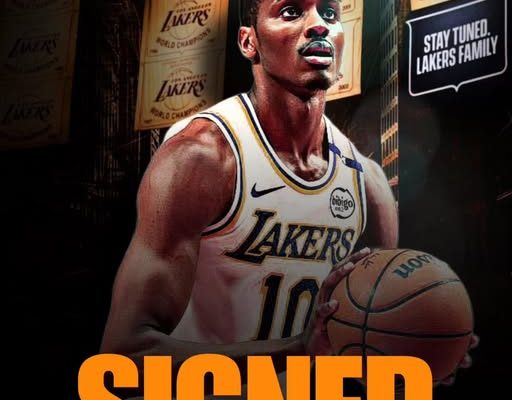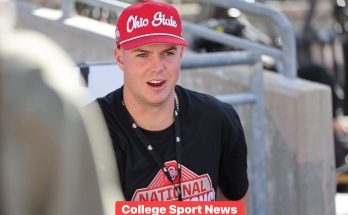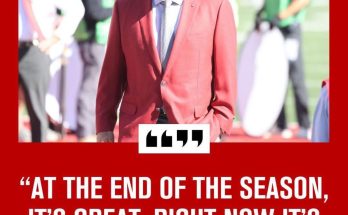The Los Angeles Lakers have once again made headlines, this time by signing 7-foot center Christian Koloko to a two-way contract, injecting youth, size, and defensive upside into a roster already filled with a mix of star power and developmental promise. For a franchise that consistently finds itself in the national spotlight, this signing is more than just a marginal move. It represents a calculated bet on potential, a defensive-minded pivot to the future, and perhaps, a low-risk high-reward maneuver that could pay dividends in a season where depth and versatility are as crucial as ever.
Christian Koloko is not your typical journeyman or fringe player. The 24-year-old Cameroonian big man brings with him a blend of raw athleticism, defensive instincts, and untapped offensive potential that had scouts excited when he declared for the NBA Draft after a standout collegiate career at Arizona. Drafted 33rd overall by the Toronto Raptors in the 2022 NBA Draft, Koloko entered the league as a project with clear upside—a rim protector with elite length and timing, traits that have become increasingly valuable in a league that emphasizes floor spacing and defensive versatility. Unfortunately, injuries have been a recurring theme in Koloko’s short NBA career. Most notably, he missed the entire 2023–24 season due to respiratory health issues that reportedly stemmed from blood clots. These complications created significant setbacks for a player still trying to establish his place in the NBA. Toronto eventually waived him earlier this summer, making him a free agent.
By offering Koloko a two-way contract, the Lakers have granted themselves a chance to develop a potential impact player without sacrificing a roster spot. The two-way deal allows Koloko to split time between the Lakers and their G League affiliate, the South Bay Lakers, where he can work his way back into peak condition and refine his skills in a lower-stakes environment. For the Lakers, the move carries little financial risk but offers considerable upside if Koloko regains form. The Lakers’ front office, led by General Manager Rob Pelinka, has made a habit of making under-the-radar acquisitions that eventually turn into rotational pieces. From the emergence of Austin Reaves to the development of Max Christie, Los Angeles has demonstrated an ability to identify and nurture undervalued talent. Koloko fits that mold perfectly. Though his offensive game is still a work in progress, his defensive prowess is where his value truly lies.
Standing at 7-feet tall with a 7’5” wingspan, Koloko has all the physical tools to become a high-level shot blocker and switchable defender. In his rookie year with the Raptors, he averaged 1.3 blocks in just 13 minutes per game—a rate that speaks volumes about his timing and presence in the paint. He also showed promise as a lob threat in transition and in pick-and-roll actions, thanks to his mobility and vertical spacing ability. These are all tools the Lakers could find invaluable during the long grind of the NBA season. With Anthony Davis anchoring the center position and often sliding to the power forward spot to preserve his body during the regular season, Koloko could serve as a much-needed backup big who complements Davis defensively and helps soak up minutes when needed. Especially in games where Davis rests or the Lakers face bigger, more physical frontcourts, Koloko could step in and provide rim protection without compromising athleticism.
There’s also a broader strategic narrative at play here. The Lakers are in a precarious window where they’re trying to balance contention with a slow rebuild. LeBron James is entering what could be his final year in the purple and gold, and while the team is certainly trying to compete for a championship, they are also building for the future with young players like Jalen Hood-Schifino, Max Christie, Dalton Knecht, and now, potentially, Christian Koloko. The front office seems determined not to mortgage the future entirely, and the signing of Koloko fits into that vision. This signing also echoes a trend across the NBA, where teams are increasingly investing in long, mobile big men who can defend the perimeter, protect the rim, and play drop coverage. The Denver Nuggets won a championship with Nikola Jokic at center, a unique case of offensive brilliance, but other teams like the Boston Celtics and Cleveland Cavaliers have leaned heavily on traditional bigs who can cover ground defensively. The Lakers are clearly trying to hedge their bets by ensuring they have size, especially after getting out-rebounded in key playoff moments over the last two seasons.
Koloko’s fit with the Lakers isn’t just theoretical. His style of play suits the defensive-minded culture that Head Coach Darvin Ham has tried to instill. Ham’s schemes rely heavily on physicality, defensive communication, and smart switching—areas where Koloko, if developed properly, could thrive. Moreover, playing alongside veterans like LeBron James and Anthony Davis could be transformative for Koloko’s growth. LeBron’s basketball IQ and playmaking can help a rim-running big like Koloko flourish in transition and pick-and-roll sets. Davis, a perennial Defensive Player of the Year candidate, can mentor him on timing, positioning, and defensive discipline. It’s a developmental environment tailor-made for a player with Koloko’s raw skill set. Even beyond his on-court potential, Koloko’s story is compelling. Born in Douala, Cameroon, he represents yet another chapter in the NBA’s growing African presence. He follows in the footsteps of Pascal Siakam, Joel Embiid, and Serge Ibaka—players who have blazed a path from Cameroon to NBA prominence. The Lakers signing him is not only a bet on basketball potential but a subtle nod to the global growth of the game. The league is increasingly international, and Koloko’s presence only deepens the Lakers’ ties to that movement.
Of course, the deal comes with questions. Koloko must prove he’s fully recovered from the health setbacks that sidelined him last season. The Lakers medical staff will undoubtedly monitor him closely, and any return to form must be gradual. The team isn’t expecting him to be a starter or even a rotation regular right away, but if he shows flashes of the player he was projected to be coming out of college, then the front office will have uncovered yet another hidden gem. For fans, this move may not generate the buzz of a blockbuster trade or a marquee free agent signing, but it’s these kinds of calculated, under-the-radar decisions that often shape the trajectory of a team. Think back to the impact of players like Alex Caruso or even Thomas Bryant—undervalued bigs who found opportunity and carved out roles with the Lakers. Koloko has a similar chance to write his own chapter.
It also sends a message to the rest of the league. While the Lakers are actively pursuing ways to improve the top end of their rotation, they are equally focused on building a sustainable supporting cast. In a salary-cap-tight era, finding cost-effective contributors is not just smart—it’s essential. With this move, the Lakers are not only preparing for the 2025–26 campaign but also building out a pipeline of talent that could help stabilize the franchise for years to come. It’s also worth considering that the signing might be part of a larger strategy in the lead-up to training camp and the regular season. The Lakers have been rumored to be exploring consolidation trades, particularly involving players like D’Angelo Russell, Rui Hachimura, and others. If a major trade materializes, Koloko could become more valuable as a depth piece or even as part of a future trade package himself.



